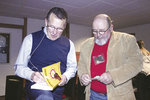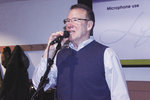Mac Macdonald still has a Screen Actors Guild card, decades after appearing in the films “American Graffiti” and “Apocalypse Now,” but he admits that most of the roles available to him now …
This item is available in full to subscribers.
We have recently launched a new and improved website. To continue reading, you will need to either log into your subscriber account, or purchase a new subscription.
If you had an active account on our previous website, then you have an account here. Simply reset your password to regain access to your account.
If you did not have an account on our previous website, but are a current print subscriber, click here to set up your website account.
Otherwise, click here to view your options for subscribing.
* Having trouble? Call our circulation department at 360-385-2900, or email our support.
Please log in to continue |
|


Mac Macdonald still has a Screen Actors Guild card, decades after appearing in the films “American Graffiti” and “Apocalypse Now,” but he admits that most of the roles available to him now “are grandpas.”
While he continued to work as an actor through the 1980s, with spots on television shows such as “Murder, She Wrote,” Macdonald’s training in psychology and his background as a teamster started drawing him into the world of professional motivational speaking.
On Feb. 8, Macdonald shared with the Jefferson County Toastmasters the same insights he’s provided to companies such as Costco, Microsoft, Volkswagen, Red Robin and Boeing. The timing of Macdonald’s presentation was fitting as both Washington State Gov. Jay Inslee and Port Townsend Mayor Deborah Stinson proclaimed the week as Toastmasters International Week.
After 34 years in Seattle, Macdonald moved to Sequim a year ago to care for a man whom he regards as a surrogate father. Once he had relocated, he found himself falling in love with the Olympic Peninsula.
THE SEVEN C’s
As part of his belief that every public speaker should tailor his message to the needs of his audience, Macdonald focused his presentation to the Toastmasters on the art of public speaking itself, and illustrated how the “seven C’s” of being an effective public speaker can translate into any vocation or relationship.
Macdonald recalled a long day of shooting on location for “Apocalypse Now,” in which he played a helicopter gunner. Like Macdonald, many of the cast and crew were tired at the end of the day, and Macdonald asked out loud, “What is [director Francis Ford] Coppola trying to get from us that we’re not giving?”
Robert Duvall immediately told him, “Kid, let me tell you something. There are two types of actors: those who constantly read their scripts and watch other actors, and the ones who have their mouths open and are choking on life’s dust.”
“I had gotten complacent,” Macdonald said, identifying one of his C’s. “But I didn’t crawl into a shell. I stuck to Bob Duvall’s shadow like glue, and looked for him to nod his head, when one of the other actors had stories to share.”
Macdonald deemed complacency “the killer of businesses and marriages,” comparing the courtship of new lovers to an employee who’s still trying to impress his boss.
“Complacency is when you take things for granted, when you say, ‘I’ve done enough’ or ‘They know I care,’” Macdonald said. “When you stop doing what you implied you would do at the start of that relationship, you’re out of integrity in their eyes.”
Macdonald believes so strongly in maintaining integrity in his presentations that he deemed it “a prostitution of intellect” when he heard Stephen Covey, author of “The 7 Habits of Highly Effective People,” give a speech to a group without considering the specific identity and needs of that audience.
“What does your audience know, and what do they want to know?” Macdonald said. “Can they relate to you? They need to know you’ve been where they are. I got one of my fingers ripped off in Alaska, so that’s an area where I can relate to people. They need to know you hurt in the places they hurt.”
Macdonald makes certain that his presentations take into account not just the higher-ups of a given group, but also the folks on the ground level, to address their practical concerns.
This commitment (another of his C’s) to doing his homework is what led Macdonald to welcome members of the Lower Elwha Klallam Tribe in their own language in his presentation to them.
Macdonald summed up the C of countenance, or one’s bearing, with two additional C’s, of confidence, “in your ability to deliver what the other person is looking for,” and conviction, “that what you have is what they need.” When a person possesses those three traits, he predicted, it would show in how they “walk, talk, act, breathe and behave.”
CHOICE, CREATIVITY
Among his other C’s, Macdonald urged his audience to develop courage to recognize that “a limited life is a choice,” and “it’s not just about showing up,” as well as creativity to introduce ideas from a new angle, even if the concepts themselves are already familiar to your audience.
Macdonald incorporates cartoons, photographs, anecdotes, statistics, videos and music into his presentations, to “escape the lecture” by engaging his audience in unique and compelling ways.
Since he was speaking to a group of Toastmasters, Macdonald advised prospective speakers never to leave your microphone behind, avoid showing your back to your audience, make good eye contact, prepare your equipment and redundant systems in case something goes wrong, and find your voice.
“Press your hand against your stomach, or bend over and shake your hands out,” Macdonald said. “Whatever voice comes out is your correct voice. It allows you a broader range of tone, and it’s more likely to be pleasant to people’s ears. Just before you go to your boss and ask for a raise, do those exercises to find your voice. But because I offer the same seminars to employers, don’t be surprised if they find their voice to tell you, ‘Hell no,’” he said, laughing.
ROOM TEMPERATURE
Among Macdonald’s other practical public speaking tips were to drink only room-temperature water during your speech, so that your throat isn’t constricted by hot or cold water; never stand in front of a window, so that you aren’t overshadowed by outside light; and try to see the room you’ll be speaking in the night before.
“Use humor, but be careful that you’re not offending anyone,” Macdonald said. “Don’t overcrowd your PowerPoint slides. Break your ideas out into separate slides.”
Whether one is a public speaker or works at another job, Macdonald urges them to tell themselves, “You are a warrior. You are bigger than your obstacles.”
Indeed, after encouraging his audience to maintain a childlike sense of wonder through the C of curiosity (there are subsets of the 7 C’s, hence the additional C’s), Macdonald emphasized the C of character with examples of the nobility that all nationalities of soldiers and civilians demonstrated during World War II, with Europeans joining Americans in landing on the beaches of Normandy during D-Day, and French families burying American soldiers because “they’d become our sons.”
“My parents served in that war,” Macdonald said. “Who am I if I don’t honor their legacies by showing up and taking part in the world?”
Macdonald cited the conclusion of “Saving Private Ryan,” in which the title character wonders whether he has lived a life that has earned the sacrifices of his fellow American soldiers who were assigned to bring him back home.
“He wanted to validate his deliverance,” Macdonald said. “You don’t need to go through a war to recognize how many people have made sacrifices for you to get where you are in life, right now. Be grateful. Push yourselves. Get involved. Do more than what’s asked of you. Protect minority rights. Be a role model to others, and leave a legacy. Like the Boy Scouts, leave the campsite better than you found it.”
FEEDBACK
Macdonald exercised his final C by inviting the Toastmasters to critique his presentation, which club member Jeffrey Hartman volunteered to do.
“Feedback is part of what makes Toastmasters so valuable,” Hartman said. “This was not a typical Toastmasters presentation, however.”
Toastmasters meetings often showcase two or three members, delivering prepared speeches lasting a few minutes each, followed by critiques that don’t last not much longer than the speeches. Members are also frequently called upon to discuss “tabletop topics,” answering impromptu questions about random subjects.
By contrast, Hartman noted that Macdonald’s presentation lasted more than an hour, and opined that it could have used some trimming.
“You’re obviously a professional who’s been doing this for years,” Hartman told Macdonald. “You were very confident and dressed appropriately. You had good gestures and eye contact. You used your voice and microphone well, although you had a little trouble with the mic. You even worked in promotions for Toastmasters itself.”
Macdonald signed copies of his book, “Lighting Your Own Fuse,” available online at
lyfeco.com, while the Jefferson County Toastmasters invited those interested in joining to attend their meetings, scheduled for the second and fourth Wednesdays of the month, 6-8 p.m. at the Highway 20 Roadhouse in Port Townsend.
For more information on Toastmasters, visit jeffco.toastmastersclubs.org.